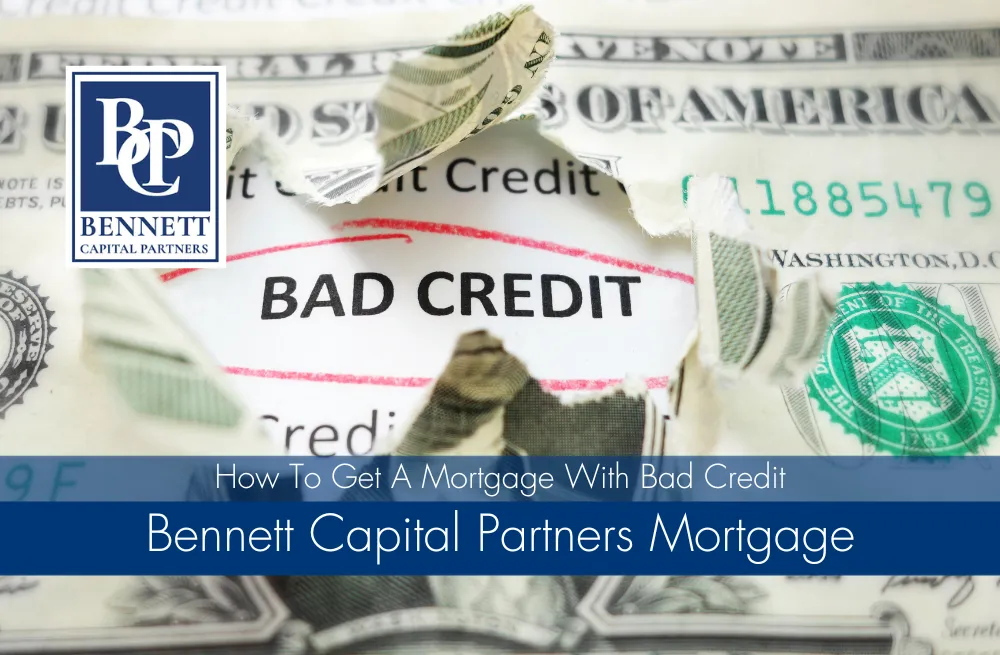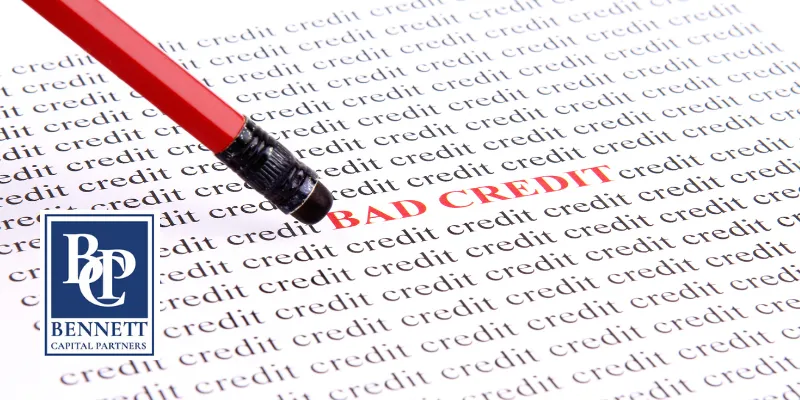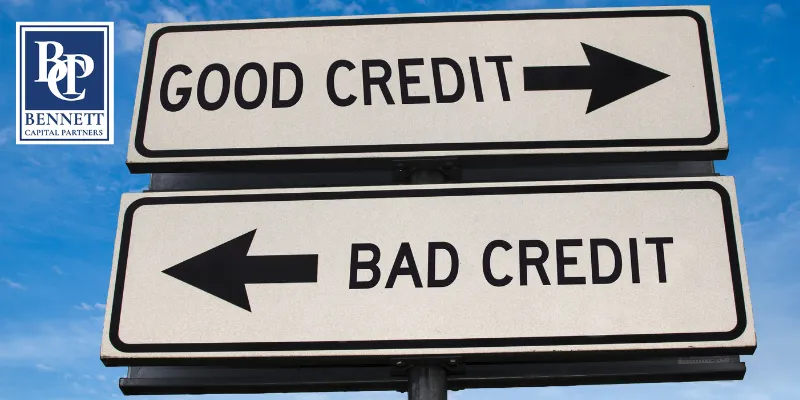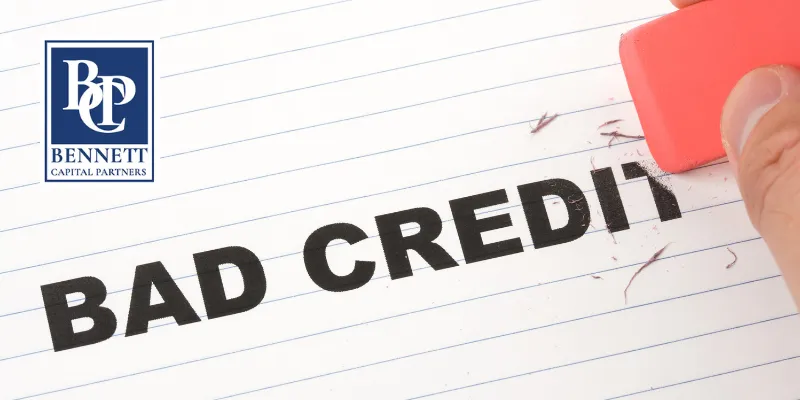How To Get A Get A Mortgage With Bad Credit
Updated: Apr 20

Are you worried that your bad credit score might hold you back from purchasing the home of your dreams? Fear not, as there's still hope for you to secure a mortgage even with bad credit.
In today's competitive housing market, it's essential to know how to navigate through the mortgage process and explore all available options. Don't let your past financial mistakes deter you from making a smart investment in your future.
In this article, we'll guide you through the necessary steps to obtain a mortgage despite having bad credit. By understanding what lenders are looking for and taking proactive steps to improve your financial situation, you'll be on your way to homeownership in no time!
Quick Navigation - Click the link below to jump to that section..
Introduction

Having a mortgage is the dream of many individuals who wish to own a home. However, getting a mortgage can be challenging, especially for those with bad credit. Credit scores play a significant role in determining one's eligibility for obtaining a home loan, such as an FHA loan, VA loan, USDA loan, or Conventional loan.
For potential homebuyers with low credit scores, it can seem like an uphill battle when trying to secure financing. Thankfully, there are several options available for those with less-than-perfect credit that may still allow them to obtain a mortgage. The Federal Housing Administration (FHA) offers loans designed explicitly for those with lower credit scores and smaller down payments. Similarly, VA loans cater to veterans and active-duty military personnel and often require no down payment or minimum credit score. Moreover, USDA loans offer financing opportunities for rural properties and also have more lenient credit requirements.
It is essential to understand your own personal financial situation when looking into these various types of mortgages. Regularly reviewing your credit report and understanding what factors contribute to your overall score will help you determine which type of home loan best suits your needs.
By focusing on improving your financial habits and working towards increasing your credit score over time, you may find that additional mortgage options become available. The key takeaway here is not to give up on your dream of homeownership just because you have bad credit.
With perseverance and research into different types of mortgages available for people with varying credit scores, finding the right home loan option tailored to your individual needs is possible. Keep exploring different avenues until you find the best fit for you and make sure always to stay informed about any changes in lending guidelines or regulations that could impact your mortgage journey.
Criteria To Consider

When it comes to getting a mortgage with bad credit, interest rates are usually higher, so it's important to shop around for the best deal.
Fees can also add up, so it pays to read all the fine print and make sure you know exactly what you're signing up for.
Loan terms can be tricky too, so make sure you understand the full scope of the agreement before you commit.
Additionally, it's beneficial to check your credit score and see if there are any errors that you can fix before applying.
Finally, be sure to consider how much you can afford to repay each month and don't be afraid to negotiate if you think you're being offered an unfair deal.
Interest Rates
When you're looking to get a mortgage with bad credit, it's important to understand that your interest rates will likely be higher than if you had a good credit score. This is because lenders see borrowers with low credit scores as a higher risk, so they charge more in interest to protect themselves against potential losses.
That being said, there are still some mortgage options available for those with bad credit, but you'll want to shop around and compare rates from different lenders before making your decision.
One crucial factor that can impact the mortgage rate you receive is the type of loan you choose. Some mortgage options have lower credit score requirements than others, which can make them more accessible for borrowers with bad credit.
For example, FHA loans typically have lower credit score requirements than conventional loans and may also allow for a lower down payment. However, keep in mind that these loans often come with additional costs like mandatory mortgage insurance premiums that can increase your overall borrowing cost.
During the mortgage application process, it's essential to be upfront about your financial situation and work closely with your lender to find the right solution for you. If you have a low credit score but are working on improving it or have other strong factors such as steady employment and a significant down payment, some lenders may be willing to offer more competitive interest rates.
Additionally, consider asking about any special programs or discounts available for first-time homebuyers or individuals who meet specific criteria—these options might help offset some of the increased costs associated with a bad credit mortgage.
In conclusion, while it may be more challenging to secure favorable interest rates when applying for a mortgage loan with bad credit, it is not impossible. By exploring various mortgage options and working diligently with your lender throughout the application process, you can increase your chances of finding an affordable solution tailored specifically to your needs.
Remember that even if you start off paying higher interest rates due to your low credit score now doesn't mean they'll remain high forever—as you continue to make on-time payments and improve your credit over time, you may eventually be able to refinance at a lower rate.
Fees
Apart from interest rates, another essential criterion to consider when trying to get a mortgage with bad credit is the fees associated with the loan. Just like those seeking a home loan with good credit, borrowers looking for a bad credit home loan will also encounter various fees and charges during the mortgage process. It's crucial to understand these fees and compare them across different lenders offering home loans for bad credit to ensure you're getting the best deal possible.
Some common fees you may encounter when applying for a mortgage with bad credit include origination fees, appraisal fees, and closing costs. Each lender may have different fee structures, so it's essential to ask about all potential costs upfront and factor them into your overall borrowing cost.
Remember that even if one lender offers a lower interest rate but higher fees, it might not necessarily be the better option overall. When comparing bad credit home loans, keep in mind that some lenders may have more flexible credit score minimum requirements than others. This can be particularly helpful if your credit utilization is high or you've had trouble qualifying for a home loan in the past due to your low score.
Be sure to discuss these requirements openly with potential lenders and provide any relevant documentation they request during the application process.
In summary, while securing an affordable mortgage with bad credit can be challenging, taking the time to thoroughly research various lending options and carefully evaluating factors such as interest rates and fees can help you find the best fit for your specific financial situation.
As you make consistent on-time payments on your mortgage and work towards improving your overall financial health, you'll increase your chances of being able to refinance at more favorable terms down the line.
Loan Terms
When looking to buy a house with bad credit, it's essential to consider the loan terms and repayment schedule offered by different lenders. Beyond interest rates and fees, the type of loan program you choose can have a significant impact on your ability to get approved and manage your mortgage payments successfully.
Different loan options may come with varying term lengths, down payment requirements, and eligibility criteria, so it's crucial to understand what each option entails before making a decision.
For those with lower credit scores, government-backed loans such as FHA or VA loans often prove more accessible since they typically have more lenient credit requirements than conventional mortgages. These programs can also offer additional benefits like lower down payment minimums or reduced mortgage insurance premiums, which can help make buying a house with bad credit more affordable in the long run.
As you explore your loan options, keep in mind that working to improve your credit throughout the mortgage process is key to increasing your chances of approval and qualifying for better terms. Prioritizing timely bill payments, reducing debt balances, and avoiding new lines of credit are all effective strategies for boosting your score while searching for the right mortgage.
Ultimately, understanding the various loan programs available and how each one aligns with your financial situation will empower you to make informed decisions about which mortgage best suits your needs. With patience and diligence in improving your financial health, you'll be better positioned to qualify for a mortgage that fits both your budget and homeownership goals.
Researching And Evaluating Lenders

First off, it's important to check that the lender has a valid license. That way, you can be sure you're dealing with a legitimate lender.
Checking out their website is another way to get a feel for the lender. You can usually find out a lot about their services, policies, and customer feedback.
When it comes to getting a mortgage with bad credit, contacting lenders directly is essential. You can ask them questions and get a better understanding of how they could be of help.
Talking to several lenders is a great way to compare their services and decide which one is right for you.
Ultimately, researching and evaluating lenders is key to finding the best mortgage for your situation.
Checking Lender Licenses
Imagine you've been working hard to improve your credit so you can buy a house, but it's still not where you want it to be. You're worried that a mortgage lender might turn you away because of your lower credit score. Don't fret – there are lenders out there willing to work with home buyers like you who have less-than-stellar credit histories.
But before you get too excited and apply for a mortgage with the first lender that says yes, take some time to check their licenses and certifications. A reputable mortgage lender should be licensed and regulated by the appropriate authorities in your area. For example, in the United States, lenders are typically regulated by state agencies or federal entities such as the National Credit Union Administration (NCUA) or the Federal Deposit Insurance Corporation (FDIC).
It's crucial to verify that the lender is properly licensed to protect yourself from potential scams and ensure they adhere to ethical lending practices. You can generally find information about a lender's licensing status on their website, but don't just take their word for it. Do your due diligence by verifying their claims through official channels like the Nationwide Mortgage Licensing System (NMLS) Consumer Access portal or contacting your local credit bureau. Double-checking this information could save you from headaches down the road if issues arise during the loan process.
Additionally, consider looking into any professional certifications that a lender may hold which indicate their commitment to providing quality service for home buyers with lower credit scores. Some organizations offer specialized training and certification programs for lenders who focus on helping borrowers with less-than-perfect credit histories secure loans.
By choosing a licensed and certified mortgage provider, you'll increase your chances of getting approved for a loan amount that meets your needs while ensuring that you're working with an ethical professional who has your best interests at heart.
Reviewing Lender Websites
After you've verified the licenses and certifications of potential mortgage lenders, it's time to delve deeper into their websites to get a better understanding of their services and expertise. This is an essential step in finding the best mortgage lender for your specific needs, especially if you're looking to buy a home with a less-than-ideal FICO score.
Many lenders use their websites as platforms to showcase their commitment to helping borrowers with varying credit histories achieve homeownership. When browsing through lender websites, keep an eye out for any resources or tools that can help you make informed decisions about your home loan options. For example, some of the best mortgage lenders provide calculators, guides on how to improve your credit score, and insights into the factors that lenders consider when assessing applications.
Additionally, look for clear and concise information about the types of loans they offer and any specialized programs designed specifically for homebuyers with lower credit scores. Customer testimonials can also be very telling when evaluating potential mortgage providers. While every borrower's experience is unique, reading about others' positive encounters with a lender can give you confidence in their ability to help you purchase a home despite your credit challenges.
Remember, though, that just because many lenders claim they work with borrowers who have less-than-stellar credit doesn't necessarily mean they're all equally skilled or dedicated in this area. As you navigate your way through various lender websites, take note of the ones that genuinely seem committed to helping prospective homebuyers in similar situations as yours.
By taking the time to thoroughly research and compare different mortgage providers online, you'll be more likely to find one who understands your needs and can guide you through the process of securing a loan that fits both your financial situation and homeownership dreams.
Contacting Lenders
Once you've thoroughly explored lender websites and read customer testimonials, the next step in finding the best mortgage lender for your needs is to directly contact them.
This will allow you to discuss your specific situation, such as having a credit score as low as 620 or needing a home loan with a minimum down payment. By speaking with lenders directly, you'll gain valuable insights into their expertise and dedication to helping homebuyers secure a mortgage despite their credit challenges.
When contacting potential lenders, be sure to inquire about any specialized programs they offer for borrowers looking to buy a home with bad credit. Also, ask about private mortgage insurance (PMI) requirements and how they might impact your monthly payments. Don't hesitate to question them regarding the likelihood of getting approved for a loan given your current financial situation.
The best mortgage lenders of 2023 should be able to provide guidance on improving your credit score and help you understand the various home loan options available.
As you speak with different lenders, take note of their responsiveness, transparency, and willingness to answer your questions thoroughly. Remember that securing a mortgage with bad credit is possible if you're working with an experienced lender who understands the unique challenges faced by borrowers like yourself.
It's crucial to choose a provider that not only offers competitive rates but also demonstrates genuine commitment in assisting borrowers regardless of their credit history.
By following these steps – from checking licenses and certifications to researching online resources and contacting lenders directly – you'll be well-equipped in identifying the most suitable mortgage provider for your particular needs.
As you narrow down your options, remember that finding the right fit is essential in ensuring a smooth journey towards homeownership despite any past credit challenges.
Partnering With A Mortgage Broker

Evaluating lender options is a great first step when partnering with a mortgage broker.
I'd recommend doing some research to find lenders that specialize in credit repair strategies.
It's important to consider all your options, so you can get the best deal for yourself.
Talking to a mortgage broker can also help you decide which lender is right for you.
Evaluating Lender Options
When you're trying to get a mortgage with bad credit, it's essential to evaluate your lender options carefully. Partnering with a mortgage broker like Bennett Capital Partners can be incredibly beneficial in this process. They have access to a vast network of hard money lenders who specialize in providing financing for individuals with less-than-perfect credit. This means that they can assist you in finding the right lender who will not only approve your loan application but also offer competitive terms and rates.
One crucial factor to consider when evaluating lender options is their minimum credit score requirement. Some lenders may require a minimum credit score of 620 or higher, while others might be more flexible and work with borrowers who have a credit score of 580 or even lower.
With the help of an experienced mortgage broker, you'll be able to identify which lenders are willing to work with your specific credit situation and find the best monthly mortgage options available.
Another important aspect when evaluating lenders is understanding what steps you can take to increase your credit score and improve your chances of getting approved for a mortgage. A knowledgeable mortgage broker can provide useful advice on how to pay down debt, dispute any errors on your credit report, and establish good financial habits moving forward.
For instance, if you currently have a 580 credit score but need a higher one to qualify for better loan terms, they can guide you on how best to achieve that goal.
Lastly, don't forget about government-backed loans such as FHA loans which often provide more lenient lending requirements for people with bad credit. To get an FHA loan, you typically need a minimum credit score of 580 and may be able to qualify for a loan even if traditional lenders have denied your application.
By partnering with a skilled mortgage broker like Bennett Capital Partners, you'll receive expert guidance throughout the entire loan application and funding process, increasing your chances of securing the financing needed for your dream home or investment property.
Credit Repair Strategies
In addition to helping you find the right lender, partnering with a mortgage broker like Bennett Capital Partners can also provide valuable insight into credit repair strategies.
If you're facing challenges due to a score of 580 or lower, there are ways to improve your credit and increase your chances of getting approved for a mortgage.
Even if bad credit doesn't disqualify you entirely from financing, working on improving your score will undoubtedly lead to better loan terms and rates.
For instance, there's no minimum credit score requirement for some lenders, but having a score of at least 580 can significantly improve your options.
By following expert advice from an experienced mortgage broker, you can work on strategies such as paying down existing debt, disputing errors on your credit report, and establishing good financial habits that will help raise your credit score over time.
The home buying process can be daunting for borrowers with credit scores below the typical minimum credit score of 620 required by many lenders.
However, with the right guidance and support from a mortgage broker like Bennett Capital Partners, it's possible to navigate through this challenging terrain and ultimately achieve your goal of homeownership.
Remember that investing time and effort into repairing your credit is well worth it in the long run, as it can open up more opportunities in terms of lender selection and loan terms.
Partnering with a knowledgeable mortgage broker ensures that you'll have access to expert advice every step of the way during this crucial journey towards financial stability and success.
Conclusion

Having explored the benefits of partnering with a mortgage broker, it's important to remember that securing a mortgage with bad credit is not an insurmountable challenge. The key lies in finding the right hard money lender who can work with your specific financial situation and investment goals. This is where Bennett Capital Partners can provide invaluable assistance, guiding you through the process of buying a home with bad credit, and ensuring that you find a suitable lender for your needs.
One major concern when seeking a mortgage with a low credit score is the potential impact on monthly mortgage payments.
However, there are options available for those who may struggle to get approval from traditional lenders:
Working with hard money lenders who specialize in providing loans to borrowers with less-than-perfect credit.
Exploring government-backed loan programs such as FHA or VA loans, which often have more lenient credit requirements.
Considering co-signing or obtaining a guarantor who has a higher credit score to help secure the loan.
Although it's generally recommended to have a credit score of at least 620 for most mortgages, it's still possible to get a bad credit home loan even with a lower score. The essential factor here is being able to demonstrate your ability to make consistent monthly mortgage payments over the life of the loan.
Remember that improving your credit score takes time, but by making timely payments and reducing outstanding debts, you'll be better positioned to take out a mortgage in the future.
The journey towards homeownership might seem daunting, especially when dealing with less-than-stellar credit. However, by working closely with Bennett Capital Partners and exploring various lending options tailored specifically for those looking to buy a house even with poor credit ratings, you'll find yourself well-equipped to navigate this complex landscape and ultimately secure financing for your dream property.
FAQ's Get A Mortgage With Bad Credit
What is a bad credit mortgage?
A bad credit mortgage is a type of mortgage designed for individuals with a low credit score. Lenders consider borrowers with a low credit score to be high risk, which means they charge higher interest rates and fees to offset the risk.
How can I qualify for a bad credit mortgage?
To qualify for a bad credit mortgage, the specific requirements will depend on the severity of your credit history. If your credit score is below 500, you will typically need to put down a 35% down payment to qualify. However, if your credit score is above 500 but below 620, there are still options available to you. It's important to work with a knowledgeable mortgage broker who can assess your unique situation and guide you through the qualification process.
What are the interest rates for bad credit mortgages?
Interest rates for bad credit mortgages are typically higher than traditional mortgages. Rates can vary depending on the lender. It's important to shop around and compare rates to find the best deal.
Can I refinance my bad credit mortgage?
Yes, getting a bad credit mortgage can help improve the borrower's credit score as long as they make their payments on time. We also offer assistance to ensure that the borrower is able to refinance into a better mortgage in the future.
What are the risks of getting a bad credit mortgage?
The main risk of getting a bad credit mortgage is that you may end up paying more in interest and fees than you would with a traditional mortgage. There is also the risk of defaulting on the loan and losing your home. It's important to understand the terms of the loan and make sure you can afford the payments before signing on the dotted line.

Philip Bennett
Philip is the owner and Licensed Mortgage Broker at Bennett Capital Partners, Bus. NMLS # 2046828. He earned his degree in Accounting and Finance from Binghamton University and holds a Master's Degree in Finance from NOVA Southeastern University. With more than 20 years of experience, Philip has been a leader in the mortgage industry. He has personally originated over $2 billion in residential and commercial mortgages.
Learn more about Philip Bennett's background and experience on our Founder's page. Whether you're a first-time homebuyer or a seasoned real estate investor, our team is here to help you achieve your real estate goals. Don't wait any longer, contact us today and let us help you find the right mortgage for your needs.
Discover helpful tips and tricks on mortgages by reading our blog posts
Understanding Co-op Financing: Mortgages For Co-ops Explained. To learn more about how this program can help you purchase your Co-op. Click here to read the full article
Mortgage Solutions for Newly Employed Individuals: Exploring Job Offer Loans. To learn more about how this program can help you purchase your dream. Click here to read the full article
DSCR loan program: debt service coverage ratio mortgage | Bennett Capital Partner To learn more about how the DSCR loan program can help you with your investment objectives. Click here to read the full article
Can You Still Get a No-Doc Mortgage in 2023? To learn more about how this program can help you get your dream mortgage. Click here to read the full article
How to Get Foreclosure Bailout Mortgages: A Step-by-Step Guide. To learn more about how this program can help you with a foreclosure bailout. Click here to read the full article
